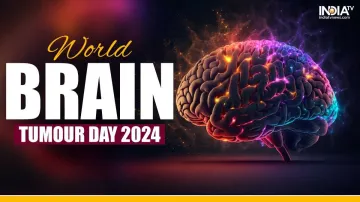World Brain Tumour Day 2024: Know everything about the growth of abnormal cells
On World Brain Tumour Day, let’s raise awareness about this critical health issue. Learn about causes, symptoms, and treatment options for brain tumours. Early detection is key for successful treatment and improved outcomes.

On this World Brain Tumour Day, observed annually on June 8th, we shed light on one of the most complex and challenging health issues affecting millions worldwide. Brain tumours, characterized by the abnormal growth of cells within the brain, remain a significant concern for medical professionals and patients alike. This day serves as a reminder of the importance of awareness, early detection, and ongoing research to combat this formidable disease.
Understanding Brain Tumours:
When asked about the nature of a brain tumour, Dr K S Kiran, a Consultant Neurosurgeon at Yashoda Hospitals Hyderabad, explained that a brain tumour is an unusual growth of cells inside the brain or the skull that encases it. Normally, old or damaged cells die and are replaced by new cells. However, in some cases, this process malfunctions, leading to the abnormal growth of damaged cells in the brain. Since the brain is surrounded by the rigid structure of the skull, any growth within this confined space can create pressure inside the skull, resulting in damage to normal brain tissue.
Tumours can be classified as benign, meaning they are localized and surrounded by a capsule, or malignant, meaning they grow rapidly, have no clear boundaries, and can spread. They can also be categorized as primary, originating from cells and structures within the brain, or secondary, spreading from another tumour in the body through blood vessels and lymph nodes, a process known as metastasis.
The occurrence and frequency of brain tumours are increasing in India (with more than 1 million cases per year). Additionally, it is the most prevalent form of cancer among children.
Causes and Risk Factors:
Exposure to Radiation: Prolonged exposure to ionizing radiation, such as from radiation therapy or nuclear accidents, can damage DNA in brain cells, increasing the risk of tumour development.
Alcohol/Smoking/Tobacco Chewing: Chronic use of alcohol, tobacco, and related products introduces carcinogenic substances into the body, potentially leading to genetic mutations and increasing the risk of brain tumours.
Exposure to Toxins: Chemicals in hair dyes, pesticides, rubber, and vinyl chloride can act as environmental toxins, increasing the likelihood of cellular damage and brain tumour formation.
Viral Infections: Infections from viruses like HIV, Human herpes virus, and polyoma virus can disrupt normal cell function, potentially leading to abnormal cell growth and brain tumours.
Allergy or Immune System Disorders: Immune system dysfunction, including allergies, can alter the body’s ability to detect and destroy abnormal cells, potentially allowing brain tumours to develop.
Symptoms:
Generalised symptoms:
- Headache
- Vomiting
- Visual disturbances (blurring, double vision, loss of visual acuity)
- Weight loss
- Low appetite
Localised symptoms:
- One-sided weakness in face/arms/hands/legs/feet
- Seizures
- Mental status changes
- Recent memory disturbances
- Personality changes
- Defects in hearing/taste/smell
- language/ speech disturbances
- Sleep disturbances( insomnia/ hypersomnia)
- Psychiatric symptoms (delusions, hallucinations, mood disorders)
- Hormonal disturbances
Symptoms in infants:
- Increase in head circumference
- Bulging fontanelle
- Cranial suture separation
- Lethargy
- Vomiting
- Feeding issues
Early detection and diagnosis:
Early detection of brain tumours is crucial for successful treatment and improved outcomes. Diagnostic procedures may include:
- CT scan, PET CT scan
- MRI scan
- Angiography
- EEG
- Skull x-ray
- Biopsy
Treatment Options:
The treatment of brain tumours depends on various factors, including the type, size, location, and overall health of the patient. Treatment modalities may include:
- Surgical: Open craniotomy and debulking of tumour, stereotactic biopsy/removal, simple decompressive craniectomy
- Radiation therapy: Stereotactic radiosurgery, brachytherapy (intra-tumor cavity radiation treatments)
- Chemotherapy: Orals/injectable, with or without surgery/radiotherapy
- Supportive care: Anticonvulsants, steroids, analgesics, Shunt surgery (for hydrocephalus)
- Rehabilitation care: Physiotherapy (for improvement of power of muscles), speech therapy, therapy in daily living activities such as eating, bathing, using the toilet, dressing or grooming.